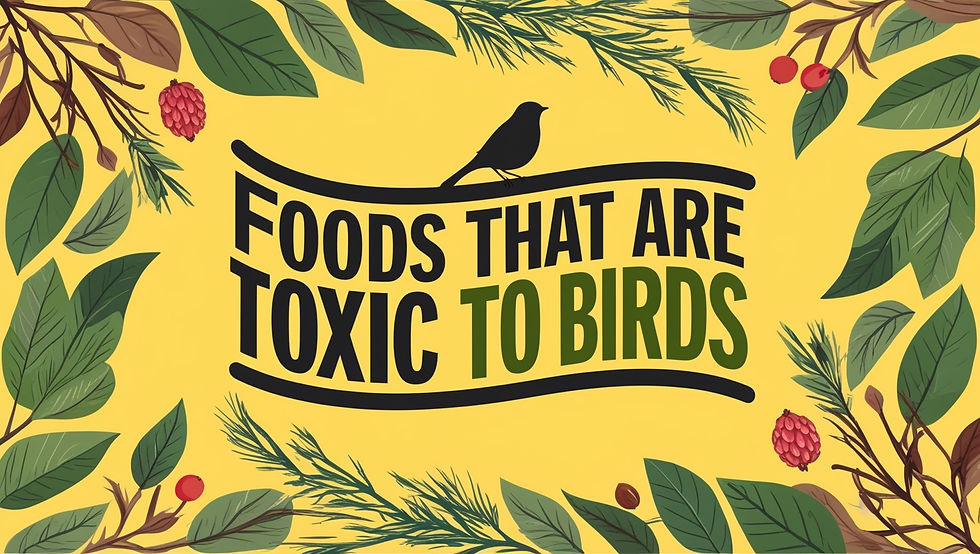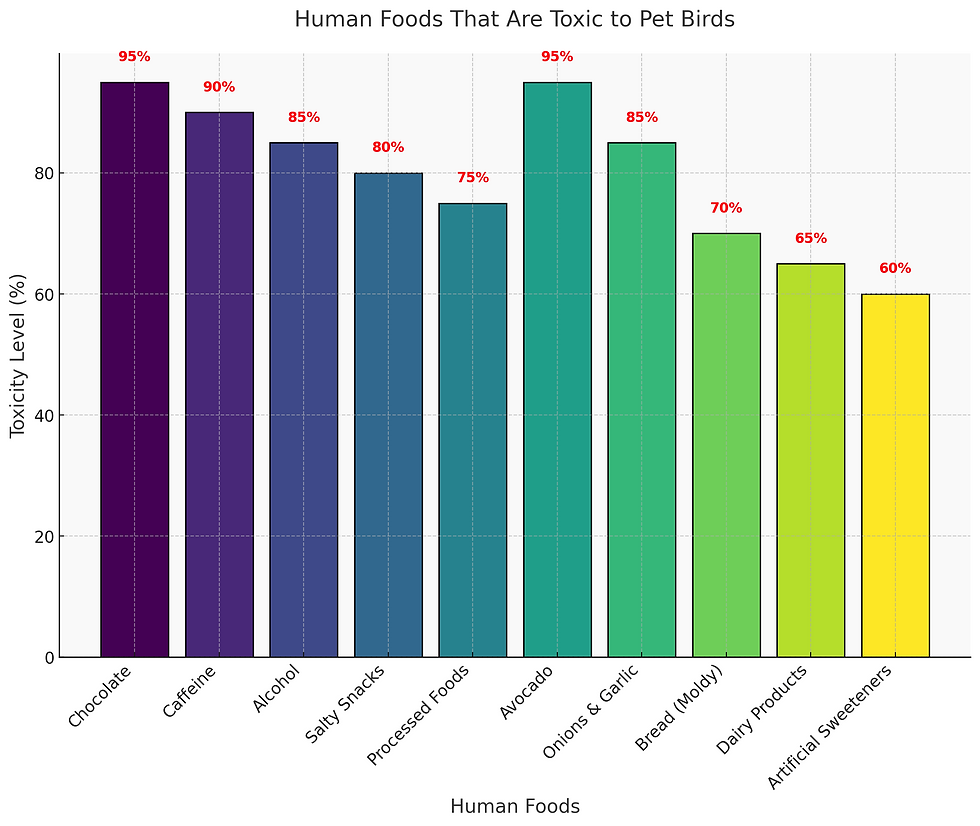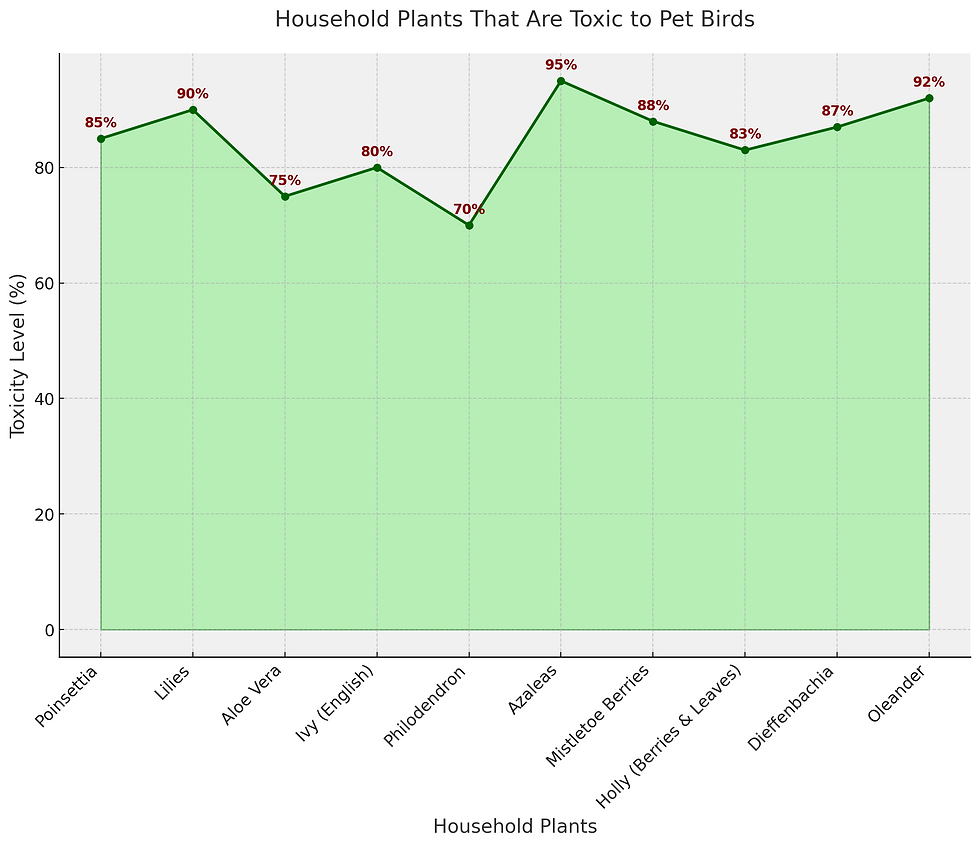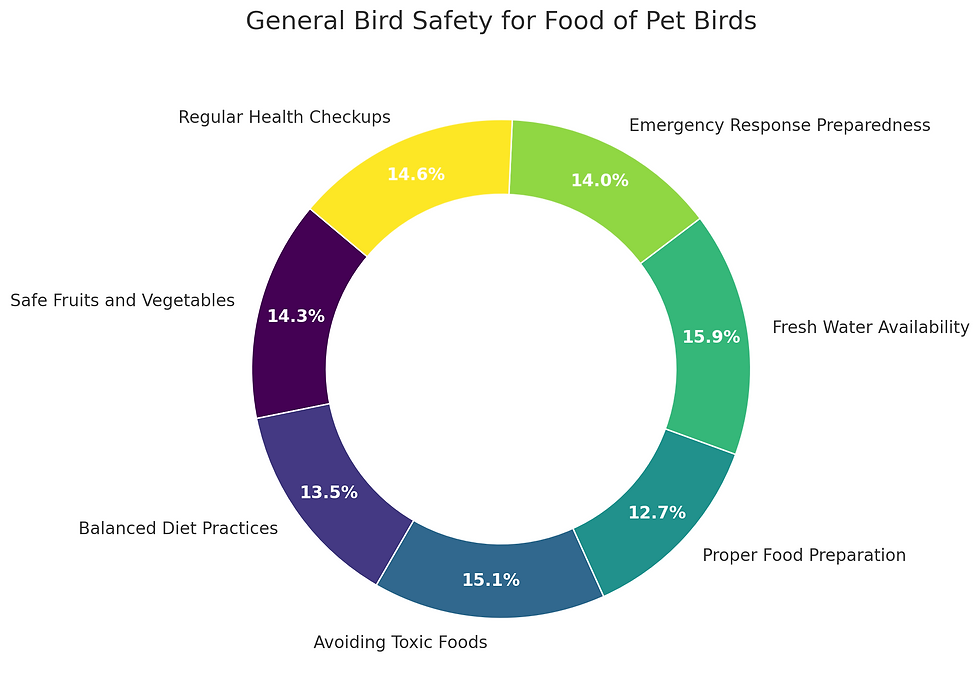Foods That Are Toxic to Birds: A Simple Guide for Bird Owners
- Saifur Rahman
- Aug 15, 2024
- 10 min read

Key Takeaways Table
Key Points | Description | Implications |
Avoid Toxic Fruits and Vegetables | Certain fruits and vegetables like avocado, onions, and rhubarb are harmful to birds. | Feeding these can lead to severe health problems, including digestive issues, respiratory failure, and death. |
Beware of Nuts and Seeds | Some nuts and seeds, such as macadamia nuts and apple seeds, contain toxins that are deadly to birds. | Consumption of these can cause neurological damage, seizures, or fatal poisoning. |
Steer Clear of Human Foods | Foods like chocolate, caffeine, and alcohol are extremely dangerous for birds. | These can lead to cardiac arrest, seizures, and other life-threatening conditions in birds. |
Household Plants Can Be Hazardous | Plants like poinsettias, lilies, and ivy are toxic to birds if ingested. | Ingestion can result in symptoms ranging from mild irritation to severe poisoning, leading to death. |
Watch Out for Additives | Artificial sweeteners, preservatives, and artificial colors can be toxic to birds. | Even small amounts can cause serious health issues, including liver damage and metabolic disturbances. |
Safe Food Practices | Preparing bird food safely involves washing, cutting, and avoiding certain cookware. | Ensures that birds receive nutritious meals without exposure to harmful substances or choking hazards. |
Emergency Response | Quick action is needed if a bird ingests something toxic, including contacting a vet. | Prompt intervention can prevent serious health consequences or death, ensuring the bird’s survival. |
Introduction
Birds are amazing pets, but did you know that some foods are very dangerous for them? Just like people, birds need to eat the right foods to stay healthy.
Some foods that are safe for us can be toxic to birds. This means that these foods can make birds very sick or even cause them to die.
In this guide, we will learn about different foods that birds should never eat.
Let's start with fruits and vegetables, which are often part of a bird's diet. But not all of them are safe!
Fruits and Vegetables

Fruits Toxic to Birds
1. Can birds eat avocado?
No! Avocado is very dangerous for birds. It contains a toxin called persin, which can cause heart problems and make birds very sick.
2. Why are grapes bad for birds?
Grapes are usually safe, but too many can cause kidney problems in some birds. It’s best to give them as a rare treat, not every day.
3. Are apple seeds toxic to birds?
Yes! Apple seeds contain a substance called cyanide. Even though it's in small amounts, it can still be harmful to birds. Always remove the seeds before giving apples to your bird.
4. Can birds eat citrus fruits?
Citrus fruits like oranges and lemons can upset a bird's stomach. They are not very dangerous but should be given in small amounts.
5. Is rhubarb dangerous for birds?
Absolutely! Rhubarb leaves contain a lot of oxalic acid, which can make birds very sick and even be fatal.
Vegetables Toxic to Birds
1. Are onions poisonous to birds?
Yes! Onions can damage a bird's red blood cells, leading to serious health problems. Birds should never eat onions.
2. Can birds eat garlic?
Garlic is similar to onions and can cause similar problems. It’s best to keep garlic away from birds.
3. Is tomato harmful to birds?
The red part of the tomato is usually safe, but the leaves and stems are toxic. To be safe, only give birds the ripe, red part of the tomato.
4. Should birds avoid spinach?
Spinach contains oxalates, which can bind with calcium and make it hard for birds to absorb this important mineral. It’s best to give spinach in small amounts.
5. Can birds eat potatoes?
Cooked potatoes are usually safe, but raw potatoes can be harmful. Raw potatoes contain solanine, a toxic substance. Always cook potatoes before giving them to your bird.
Unknown Toxic Fruits and Vegetables
Some fruits and vegetables are less known but can still be harmful. For example:
Mango pits can be toxic, so always remove them before feeding mango to your bird.
Eggplant contains solanine, just like raw potatoes, and should be given in small amounts if at all.
Table: Safe vs. Unsafe Fruits and Vegetables for Birds
Safe Fruits | Unsafe Fruits | Safe Vegetables | Unsafe Vegetables |
Apples (without seeds) | Avocado | Carrots | Onions |
Bananas | Rhubarb | Peas | Garlic |
Blueberries | Grapes (in moderation) | Bell peppers | Raw potatoes |
Strawberries | Mango pits | Broccoli | Eggplant |
Nuts and Seeds

Toxic Nuts for Birds
1. Can birds eat peanuts?
No! Peanuts can be very harmful to birds, especially if they are moldy. Moldy peanuts can contain a toxin called aflatoxin, which can make birds very sick. It's better to avoid feeding peanuts to birds.
2. Are macadamia nuts dangerous for birds?
Yes! Macadamia nuts are toxic to birds and can cause weakness, tremors, and even paralysis. Always keep these nuts away from your feathered friends.
3. Should birds avoid walnuts?
Walnuts are generally safe for birds, but they must be fresh and free from mold. Moldy walnuts can cause serious health issues due to aflatoxin, just like peanuts.
4. Can birds eat almonds?
Yes, but with caution. Almonds are usually safe if they are raw and unsalted. However, bitter almonds contain cyanide and are extremely dangerous for birds. Stick to sweet almonds, and always serve them in small amounts.
Seeds Harmful to Birds
1. Are apple seeds toxic to birds?
Yes! As mentioned earlier, apple seeds contain cyanide, which can be deadly to birds. Always remove the seeds before giving apples to your bird.
2. Can birds eat cherry pits?
No! Cherry pits, like apple seeds, contain cyanide and should never be given to birds. Make sure to remove the pits if you feed cherries to your bird.
3. Are apricot seeds safe for birds?
No! Apricot seeds also contain cyanide and can be very dangerous. Always remove them before feeding apricots to birds.
4. Should birds eat plum seeds?
No! Plum seeds are toxic and should not be given to birds. Like other stone fruits, the seeds contain cyanide.
Table: Safe vs. Unsafe Nuts and Seeds for Birds
Safe Nuts | Unsafe Nuts | Safe Seeds | Unsafe Seeds |
Almonds (sweet, raw) | Macadamia nuts | Sunflower seeds | Apple seeds |
Unsalted cashews | Moldy peanuts | Pumpkin seeds | Cherry pits |
Unsalted pistachios | Bitter almonds | Flaxseeds | Apricot seeds |
Walnuts (fresh, mold-free) | Chia seeds | Plum seeds |
For more details on safe food practices for birds, you can explore this comprehensive guide on cage materials.
Human Foods

Foods Birds Should Never Eat
1. Is chocolate toxic to birds?
Yes! Chocolate is very dangerous for birds. It contains theobromine and caffeine, which can cause vomiting, diarrhea, heart problems, and even death. Never give your bird any chocolate.
2. Can birds have caffeine?
No! Caffeine is harmful to birds. It can cause hyperactivity, increased heart rate, and even cardiac arrest. Avoid giving birds tea, coffee, or any caffeinated drinks.
3. Are alcohol and birds a dangerous combination?
Yes! Alcohol is toxic to birds. It can cause severe damage to their liver and brain, leading to death. Birds should never be given alcohol.
4. Can birds eat processed foods?
No! Processed foods often contain high amounts of salt, sugar, and harmful preservatives that can be toxic to birds. Stick to natural foods that are safe for birds.
5. Should birds eat salty snacks?
No! Salt is very dangerous for birds. Even small amounts can upset the balance of electrolytes in their bodies, leading to dehydration, kidney failure, and death. Avoid giving birds any salty snacks.
Dairy and Birds
1. Can birds have cheese?
In small amounts. Birds are lactose intolerant, so dairy products like cheese should be given sparingly. Too much can cause digestive problems.
2. Are milk and birds a bad mix?
Yes! Like cheese, milk contains lactose, which birds cannot digest properly. It can lead to stomach upset and diarrhea.
3. Is yogurt safe for birds?
In moderation. While yogurt is fermented and may contain less lactose, it should still be given in very small amounts to avoid digestive issues.
Specific Human Foods Harmful to Birds
1. Can birds eat avocado?
No! As mentioned earlier, avocado contains persin, which is toxic to birds and can cause serious health problems.
2. Should birds avoid onions and garlic?
Yes! Both onions and garlic can damage a bird's red blood cells, leading to anemia and other serious health issues. Keep these away from your bird's diet.
3. Is bread bad for birds?
Yes! Bread is not nutritious for birds and can fill them up without providing the nutrients they need. Additionally, moldy bread can be harmful due to mycotoxins.
For more tips on keeping your bird healthy, check out this helpful guide on hydration needs for birds.
Household Plants

Houseplants Toxic to Birds
1. Are poinsettias dangerous for birds?
Yes! Poinsettias are popular holiday plants, but they are toxic to birds. If a bird nibbles on the leaves, it can cause irritation to their mouth and stomach, leading to vomiting and drooling.
2. Can birds be around lilies?
No! Lilies are extremely dangerous for birds. They can cause kidney failure, which can be fatal. It’s best to keep lilies out of your home if you have pet birds.
3. Is aloe vera toxic to birds?
Yes! Aloe vera, while often used for its soothing properties on human skin, can be harmful to birds. Ingesting aloe can lead to digestive issues like diarrhea.
4. Should birds avoid ivy?
Yes! Ivy plants, especially the English Ivy, are toxic to birds. If ingested, ivy can cause difficulty breathing, convulsions, or even coma in severe cases.
5. Are philodendrons harmful to birds?
Yes! Philodendrons are common houseplants, but they contain calcium oxalate crystals, which can irritate a bird’s mouth and digestive system, leading to swelling and difficulty swallowing.
Outdoor Plants and Birds
1. Are azaleas toxic to birds?
Yes! Azaleas are beautiful, but they contain grayanotoxins, which are harmful to birds. Ingesting even a small amount can cause symptoms like vomiting, diarrhea, and heart problems.
2. Can birds eat mistletoe berries?
No! Mistletoe berries are toxic to birds. Eating them can cause digestive upset, difficulty breathing, and even death.
3. Are holly plants dangerous for birds?
Yes! Both the leaves and berries of holly plants are toxic to birds. Ingesting them can lead to nausea, vomiting, and diarrhea.
For more information on keeping your bird's environment safe, you can explore this detailed guide on safe bird toys.
Foods with Toxic Additives

Artificial Sweeteners and Birds
1. Is xylitol harmful to birds?
Yes! Xylitol is a common artificial sweetener found in sugar-free gum, candy, and some baked goods. It is extremely toxic to birds and can cause rapid insulin release, leading to hypoglycemia (low blood sugar), seizures, and even death.
2. Can birds eat sugar substitutes?
No! Most sugar substitutes, including aspartame, saccharin, and sucralose, can be harmful to birds. These chemicals are not natural and can cause digestive problems and other health issues in birds.
3. Are diet foods safe for birds?
No! Diet foods often contain artificial sweeteners like xylitol, which are toxic to birds. It’s best to avoid feeding any diet products to your bird to prevent accidental poisoning.
Chemical Additives in Foods
1. Should birds eat foods with preservatives?
No! Preservatives like BHA, BHT, and ethoxyquin are added to foods to keep them fresh, but they can be harmful to birds. These chemicals can cause liver damage, digestive issues, and other health problems.
2. Are artificial colors dangerous for birds?
Yes! Artificial colors, often used in processed foods, can be toxic to birds. These synthetic dyes can cause allergic reactions, behavioral changes, and long-term health problems in birds.
Table: Dangerous Food Additives for Birds
Toxic Additives | Found In | Potential Harm |
Xylitol | Sugar-free gum, candy, diet foods | Hypoglycemia, seizures, death |
Aspartame, saccharin | Diet sodas, sugar substitutes | Digestive issues, behavioral changes |
BHA, BHT, ethoxyquin | Processed foods, pet food | Liver damage, digestive problems |
Artificial colors (e.g., Red 40) | Candy, snacks, processed foods | Allergic reactions, behavioral issues |
For more tips on keeping your bird healthy and safe, you can explore this guide on introducing new birds.
General Bird Safety

Safe Food Practices
1. How to safely prepare food for birds
Always wash fruits and vegetables thoroughly to remove any pesticides or chemicals. Cut them into small, bite-sized pieces to prevent choking. Avoid using non-stick cookware when preparing bird food, as the fumes can be toxic.
2. Safe fruits and vegetables for birds
Some fruits and vegetables are safe and healthy for birds. These include apples (without seeds), carrots, blueberries, and bell peppers. Make sure to remove any seeds or pits that could be harmful.
3. Best practices for feeding birds
Offer a variety of foods to ensure a balanced diet. Avoid feeding birds foods high in fat, salt, or sugar. Fresh water should always be available, and food dishes should be cleaned daily to prevent bacterial growth.
Emergency Response
1. What to do if your bird eats something toxic?
If you suspect your bird has ingested something toxic, act quickly. Remove the food, and contact an avian veterinarian immediately. Have the packaging or a description of the food handy when you call.
2. How to recognize signs of food poisoning in birds
Symptoms of food poisoning in birds can include vomiting, diarrhea, lethargy, and difficulty breathing. If you notice any of these signs, seek veterinary help right away.
For more insights on maintaining your bird's well-being, check out this detailed guide on cage placement.
Conclusion
Understanding which foods are toxic to birds is essential for keeping your feathered friends healthy and happy.
From certain fruits and vegetables to nuts, seeds, and even some common human foods, many items we enjoy can be dangerous or even fatal to birds.
By learning about these risks, you can make safer choices when it comes to feeding and caring for your birds.
Please Remember:
Avoid Toxic Fruits and Vegetables: Foods like avocado, onions, and rhubarb are harmful to birds and should never be part of their diet.
Beware of Nuts and Seeds: While some nuts and seeds are safe, others like macadamia nuts and apple seeds can be deadly.
Steer Clear of Human Foods: Chocolate, caffeine, and alcohol are extremely dangerous to birds.
Household Plants Can Be Hazardous: Keep plants like poinsettias and lilies out of reach of your birds.
Watch Out for Additives: Artificial sweeteners and preservatives can be toxic, so always check ingredients carefully.
By following safe food practices and being vigilant about what your bird eats, you can help prevent accidental poisoning and ensure a long, healthy life for your pet.
Call to Action
Take a moment to review the foods you currently offer your bird. Are there any toxic items you need to remove from their diet?
Share this article with other bird owners to help spread the word about bird-safe foods. And if you’re looking for more tips on bird care, be sure to visit our comprehensive guides, like this one on vitamins and supplements for birds.



Comments